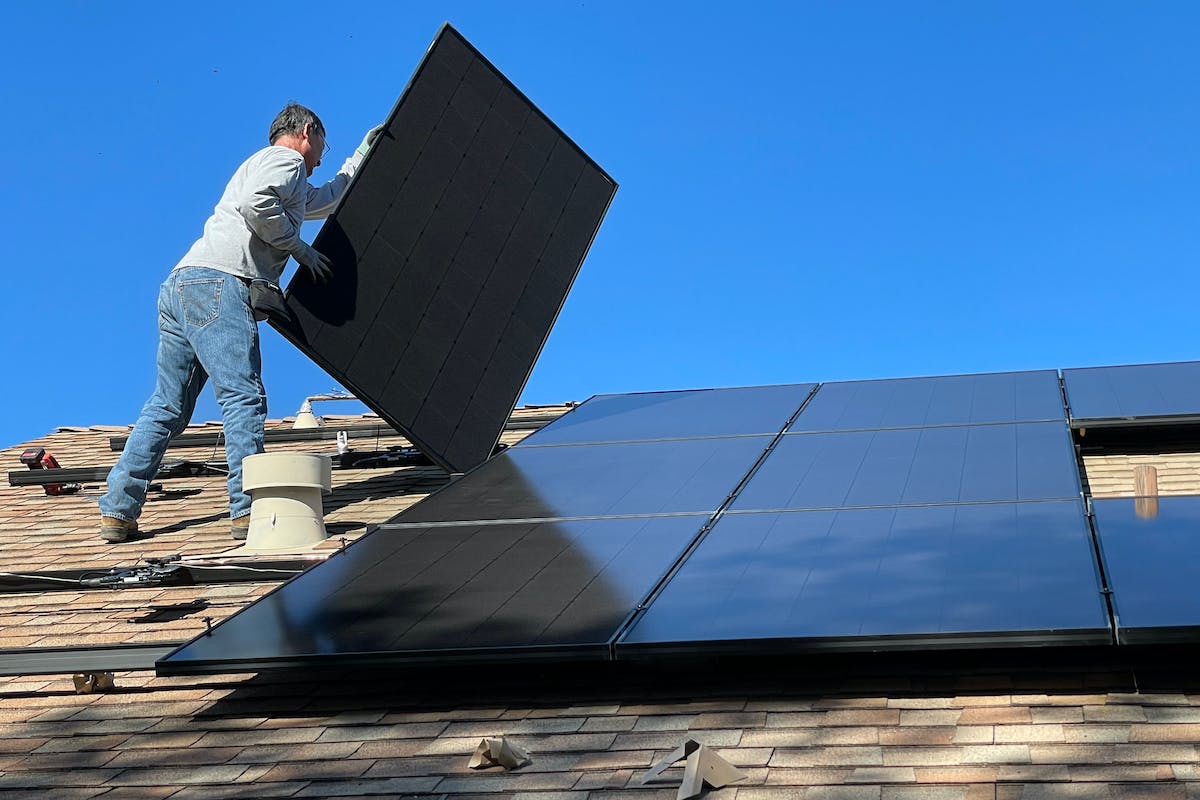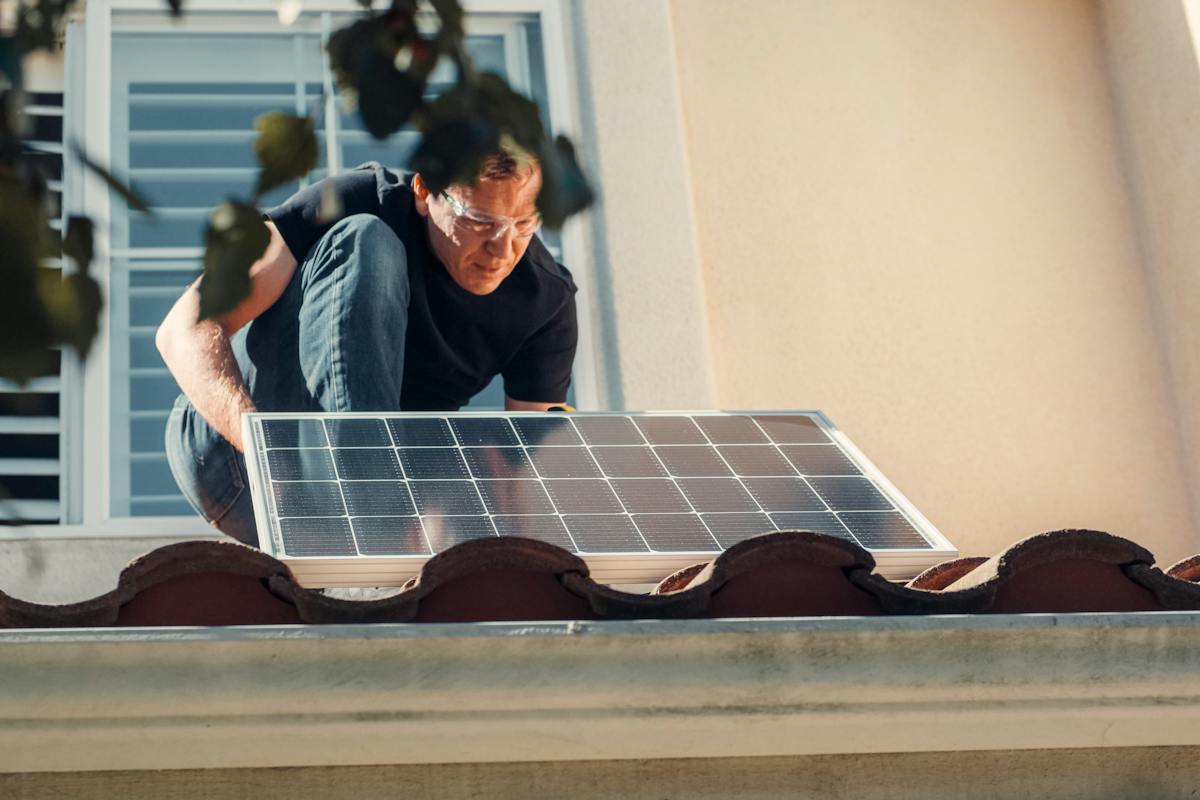Have you ever thought about how much energy the sun provides us every day, and considered how you can tap into this infinite resource? Solar panels offer a viable solution for homeowners looking to harness the power of the sun and reduce their reliance on traditional energy sources.
In the ultimate guide to solar panels for homeowners, we’ll cover everything you need to know about solar panels, from how they work to factors to consider when purchasing them. After all, making the switch to solar energy is a big investment, and you want to make sure you have all the information before taking the plunge.
Understanding Solar Energy
Solar energy, the clean and renewable power derived from converting sunlight into electricity, is revolutionizing the way we power our homes. With its numerous benefits and cost-saving potential, it’s no wonder that more and more homeowners are embracing residential solar panels. Learning the ultimate guide to solar panels for homeowners will help you understand the basics of solar energy and how it can benefit your home.
How Do Solar Panels Work?
Solar panels or photovoltaic (PV) cells are made up of multiple silicon layers that absorb photons from sunlight. Here’s how solar panels generate electricity for your home.
Absorbing Sunlight
The magic happens within the multiple silicon layers of the solar panels. These layers act as photon absorbers, capturing the energy from sunlight. When sunlight hits the panels, it initiates a reaction that causes a flow of electrons.
Creating an Electrical Current
As the electrons start moving, they generate an electrical current. This direct current (DC) is the initial form of electricity produced by the solar panels. It’s important to note that this current is not immediately compatible with most home appliances and electrical systems.
Conversion to Usable Electricity
To make the electricity usable in your home, an inverter comes into play. The inverter converts the DC into alternating current (AC), which is the type of electricity used by most household appliances. With this conversion, the electricity becomes compatible with your home’s electrical system.
Powering Your Home
And voila! You now have usable electricity to power your home. The solar panels, through their absorption of sunlight and the subsequent conversion process, provide a sustainable and renewable energy source. By harnessing the power of the sun, you can reduce your carbon footprint and contribute to a greener future.
Types of Solar Panels for Houses
When it comes to residential solar panels, there are several options to consider. Each type has its own advantages and disadvantages, so it’s important to find the one that suits your needs and preferences.
Monocrystalline Panels: Efficiency at a Cost
Monocrystalline panels are known for their high efficiency, meaning they can convert more sunlight into electricity. However, this efficiency comes with a higher price tag. If you prioritize maximum energy output and have a larger budget, monocrystalline panels may be the right choice for you.
Polycrystalline Panels: Affordability with Slightly Less Efficiency
If cost is a concern but you still want to harness the power of solar energy, polycrystalline panels are worth considering. While they are slightly less efficient than monocrystalline panels, they offer a more affordable option. If you have a limited budget but still want to enjoy the benefits of solar energy, polycrystalline panels may be the right fit for you.
Thin-Film Panels: Budget-Friendly but Space-Intensive
For those looking for a more budget-friendly option, thin-film panels are worth exploring. They are the cheapest of the three types, making them a popular choice for budget-conscious homeowners. However, it’s important to note that thin-film panels require more space compared to monocrystalline and polycrystalline panels. If you have ample roof space available, thin-film panels could be a suitable option for you.
Benefits of Solar Panels for Homeowners
There are numerous benefits to home solar panel installation ranging from financial savings to environmental contributions. Discovering these benefits will show why homeowners are increasingly switching to this sustainable and renewable power source.
Clean Energy with Zero Harmful Emissions
Say goodbye to harmful emissions and reduce your carbon footprint. You can make a significant contribution towards a healthier planet. This environmentally-friendly energy source reduces the use of fossil fuels, making it a clean and renewable alternative.
Significant Cost Savings
Apart from reducing your carbon footprint, solar panels for houses can also greatly reduce your monthly electricity bill. By generating your own electricity, you’ll be less reliant on traditional energy sources and their fluctuating prices. Over time, this can lead to significant financial savings for homeowners.
Increased Home Value
Investing in solar panels can also increase the value of your home. As more and more people prioritize sustainable living, homes with solar panel installations become more attractive to potential buyers. This means you could potentially get a higher return on investment when selling your home.
Earn Money with Net Metering
Take advantage of net metering programs and turn your excess electricity into income. By selling the surplus energy back to the grid, you can further maximize your cost savings and create a positive impact on your finances. This is a great way for homeowners to take control of their energy usage and potentially earn money while doing so.
Factors to Consider When Purchasing Solar Panels

Before purchasing solar panels for your home, there are a few factors you should consider to ensure that you make an informed decision:
Location
The amount of sunlight your home receives is a crucial factor in determining the effectiveness of solar panels. Generally, areas with more sunshine will produce more energy than those with less.
Roof Orientation and Angle
Ideally, solar panels should face south at an angle between 15-40 degrees to maximize sunlight absorption.
Available Space
The size and shape of your roof will affect the number of solar panels you can install. If your roof is shaded or angled, it may limit the amount of space available for solar panels.
Budget
Solar panel systems can be expensive upfront, but they offer long-term cost savings. Consider your budget and choose a system that suits your financial situation.
Maintenance and Care
Solar panels require minimal maintenance, making them a hassle-free addition to your home. However, it’s essential to keep them clean and free of debris for optimal performance. You may need to hire professionals to clean the panels periodically, especially if you live in an area with heavy pollution or frequent weather events.
Home Solar Panel Installation
Installing solar panels in your home is a significant step towards sustainable living. It’s a process that requires careful planning, from choosing the right type of solar panel to finding a reputable installation company.
Assessing Your Site
The first step towards getting solar panels installed is a thorough assessment of your property. A professional will evaluate factors like sun exposure, roof condition, and available space to determine the best placement for maximum energy production.
Designing Your System
Once the assessment is complete, customized home solar power systems will be designed specifically for your home. This includes determining the number of panels, their positioning, and the type of inverter that suits your energy needs.
Securing Permits
Before installation can begin, permits must be obtained from local authorities. Don’t worry, your residential solar panel providers will take care of this paperwork, ensuring all necessary approvals are obtained for a hassle-free process.
Professional Installation
The actual installation of solar panels will be handled by certified technicians. They will carefully and safely mount the panels on your roof, connect them to the electrical system, and test everything to ensure optimal performance.
When you utilize residential solar panels, you not only reduce your reliance on traditional energy sources but also contribute to a greener and more sustainable future for generations to come. Embrace the transformative potential of solar energy and join the movement towards a cleaner and brighter tomorrow!
Costs and Financing Options
When it comes to home solar power systems, the cost can vary greatly based on factors like system size, equipment, and installation costs. However, don’t let the upfront costs deter you. There are several financing options available that can make solar power more accessible to you.
Financing Options: Making Solar Power Affordable
There are various financing options available for your solar journey. One option is solar loans, which allow you to spread the cost of installation over time, making it more manageable for your budget. Leases and power purchase agreements (PPAs) are also alternative options. Leases let you lease the system and pay a fixed monthly amount, often with minimal upfront costs. PPAs allow you to purchase solar energy at a predetermined rate, guaranteeing savings on your energy bills.
Incentives: Offsetting the Initial Investment
Federal, state, and local incentives can offset the upfront cost of a home solar power system. These incentives promote renewable energy adoption and include tax credits, rebates, and grants. By leveraging these incentives, homeowners can reduce reliance on traditional energy sources and enjoy long-term financial benefits. Tax credits lower the overall system cost, rebates provide direct financial incentives, and grants support installation and maintenance. With these incentives, going solar is a financially attractive option for homeowners.
Maintaining Your Solar Panels
Like any other home investment, solar panels require regular maintenance to ensure optimal performance and longevity. Fortunately, they are relatively low-maintenance and can last over 25 years with proper care.
Cleaning Your Solar Panels
One of the most important aspects of maintaining your solar panels is keeping them clean. Dust, dirt, and debris can accumulate on the surface of the panels, reducing their efficiency. Fortunately, cleaning solar panels is a simple process that can be done with a soft cloth and water. However, it’s recommended to leave this task to professionals who have the necessary equipment and expertise.
Regular Inspections
Regular inspections by a professional are also crucial in maintaining your solar panels. They can identify any issues or damage early on, allowing for timely repairs and preventing any potential long-term damage.
While you can perform routine maintenance on your own, it’s highly recommended to schedule periodic professional inspections. Certified solar technicians have the expertise to identify any issues that may go unnoticed and provide necessary repairs or adjustments. This proactive approach can prevent potential problems and prolong the lifespan of your solar panels.
Early issue detection:
By conducting regular inspections, you can proactively catch any potential issues early on. This includes identifying loose connections, damaged wiring, or any other signs of malfunction that may compromise the performance and safety of your system. Addressing these problems promptly not only prevents further damage but also ensures optimal performance, extends the lifespan of your equipment, and minimizes the risk of costly repairs in the future.
Taking the time to regularly inspect and maintain your systems demonstrates a commitment to efficiency, reliability, and the overall longevity of your assets.
Choose Solar, Choose Sustainability
Embrace the power of solar energy for homes and make a positive impact on the environment and your wallet. Join the growing community of solar panel users and be part of the sustainable future we all strive for. With the ultimate guide to solar panels for homeowners, you now have all the information you need to make an informed decision and take full advantage of this clean and renewable energy source.
So, as you strive to build your dream home, consider the long-term benefits and positive impact of solar panels. Let the sun’s rays illuminate not only your living space but also your commitment to a sustainable future. Take a step towards a greener tomorrow and harness the power of the sun to create a home that is both environmentally conscious and beautifully designed.
